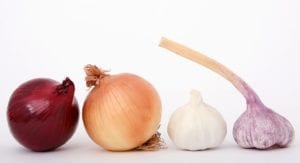 Some foods may affect the body odor, breath and smell of urine. This is due to the microorganisms living on the skin and in the mouth, as well as through the penetration of sweat metabolites into the sweat and urine. What food and spices evoke the unpleasant smell of the body?
Some foods may affect the body odor, breath and smell of urine. This is due to the microorganisms living on the skin and in the mouth, as well as through the penetration of sweat metabolites into the sweat and urine. What food and spices evoke the unpleasant smell of the body?
Why does food affect the body odor?
The scent of the body is associated primarily with the smell of sweat and fragrance of the mouth.
One of the types of sweat glands, which develops only during puberty and is responsible for the detoxification of the body, releases components that after being processed by the bacteria on the surface of the skin can cause an unpleasant odor. The sweat secreted by these glands consists of water, fatty compounds, proteins, organic acids and urea. Its composition varies depending on the diet used. Consuming different products may result in the formation of phosphorus and sulfur compounds, butyric acid, capric acid, acetic acid and others, ethyl alcohol and acetone. Decomposing these ingredients by microorganisms living on the skin can cause a bad smell.
Unpleasant odor from the mouth is usually associated with the consumption of a product rich in essential oils, released from the digestive tract after eating, as well as with the development in the mouth of a favorable environment for the development of bacteria secreting odorous fragrant metabolites.
In turn, the smell of urine can change when it is excreted with large amounts of an unnecessary metabolic component with a strong aroma.
What food products change the smell of the skin?
Scientists’ research shows that the skin of vegetarians and people eating meat has a different smell, and as a less pleasant odor we can smell the carnivores. Unfavorable body odor has people consuming large amounts of highly processed food: junk food, ready meals, salty snacks and sweets. This is due to the high content of unhealthy fats, which are a breeding ground for bacteria and chemical additives, including preservatives, aromas and dyes whose metabolites can negatively change the body odor.
Other products that increase the unpleasant smell are spicy spices. They dilate sweat glands and increase the secretion of sweat. In addition, curries and cumin leave a bad smell of skin. Healthy products that affect the unpleasant smell of the body are vegetables containing sulfur compounds: garlic, onion, broccoli, cauliflower, cabbage, kohlrabi or radish. Sulfur in various forms penetrates into the sweat, and because it is volatile, we feel its intense odor.
Sweat can have a slightly fishy odor, which will not only come from eaten fish, but also from meat and vegetables releasing in the process of digestion of trimethylamine – beets, spinach, cruciferous and cruciferous vegetables, soy and its products and other pods.
-Not just garlic – which causes bad breath?
The product, which has a very negative effect on the smell of the mouth, is coffee. This drink has a sour taste, which in itself creates a disadvantageous atmosphere in the mouth. It also dries mucous membranes, and in a situation of shortage of saliva rinsing the gums and teeth, the bacteria multiply very quickly, causing bad breath. The bad smell from the mouth is also a consequence of eating garlic, leeks and onions. Their essential oils are exhaled from the body up to 3 days after eating the food with this product. It is worth taking this into account when planning an important exit or meeting.
Bad breath is very often the cause of excessive sugar and other simple carbohydrates in the diet. Sugar from sweets, drinks, cakes, pasta or bread, and even from peppermints and chewing gums begins to be digested in the mouth. Its decomposition reduces the pH in the mouth, and the acidic environment speeds up the multiplication of bacteria, causing an unpleasant odor. To prevent it, it is best to brush your teeth immediately after eating something with sugar or rinse your mouth very thoroughly with water.
Also, long hours of not eating can cause annoying breathing. This is related to the perceptible smell of acetone generated in metabolic processes.
What diet affects the bad smell of urine?
In the context of food changing the smell of urine, it is most often said about asparagus. Indeed, asparagus affects the smell of urine, but this change senses only 15 percent population with a minor genetic mutation. The smell changes due to mercaptan – a sulfur compound present in asparagus.
Trimethylamine palpable can also be felt in the urine as a fishy odor after eating meat, fish, beetroot, spinach, cruciferous and cruciferous vegetables, soybeans and other legumes.
Other products that can change the smell of urine include:
- Garlic,
- oriental spices,
- vitamin B supplements.
Picture Credit: NjoyHarmony
